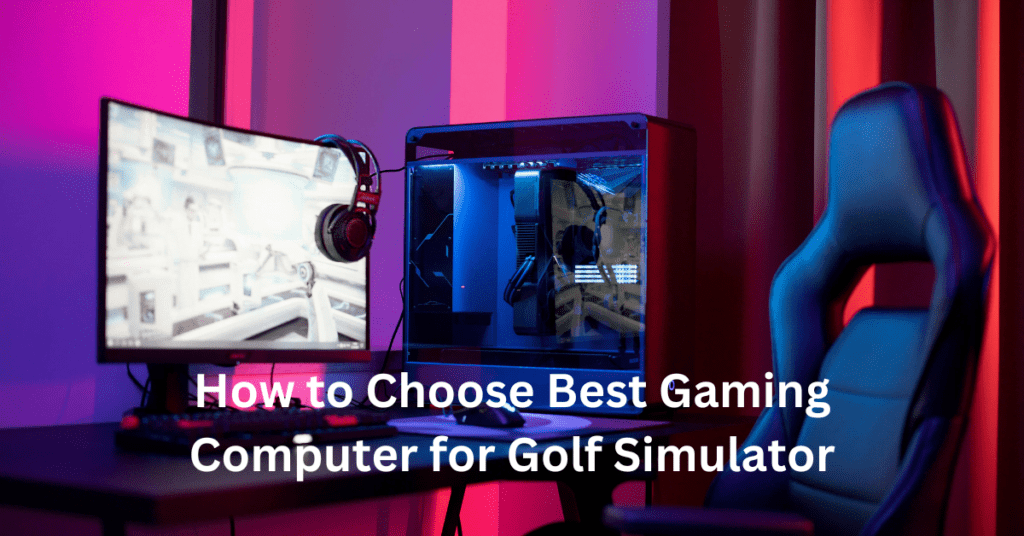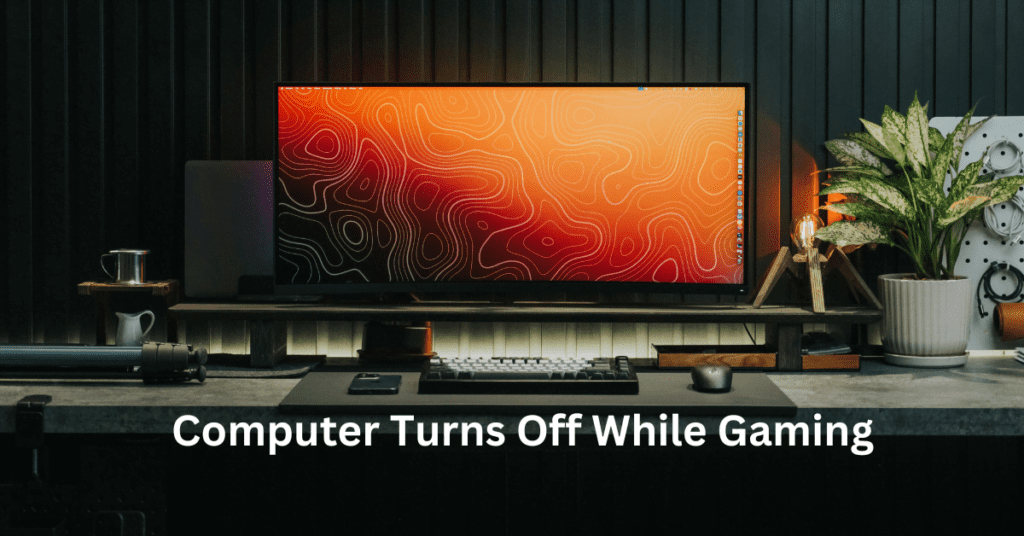Competitive gaming has grown from a niche hobby into a global phenomenon, with millions of players competing in esports tournaments for fame and fortune. Whether you’re battling in Valorant, strategizing in League of Legends, or dominating in CS:GO 2, one thing remains constant: the need for a gaming PC that delivers top-tier performance. In the fast-paced world of competitive gaming, even a slight lag or drop in frame rate can mean the difference between victory and defeat. The Best Gaming PCs for Competitive Gamers
A powerful gaming PC is essential for achieving high FPS, low latency, and seamless gameplay. It not only enhances your in-game performance but also provides the reliability needed during intense tournaments. However, with so many options on the market, finding the best gaming PC for competitive gaming can be overwhelming. Should you choose a pre-built setup or build your own? What specs matter most? How can you future-proof your investment?
This guide simplifies the decision-making process by providing detailed recommendations for the best gaming PCs in 2024. Whether you’re on a budget or looking for a high-end setup, we’ll cover everything you need to know, from essential hardware to optimizing performance. Get ready to elevate your competitive edge with a PC tailored to your gaming needs.
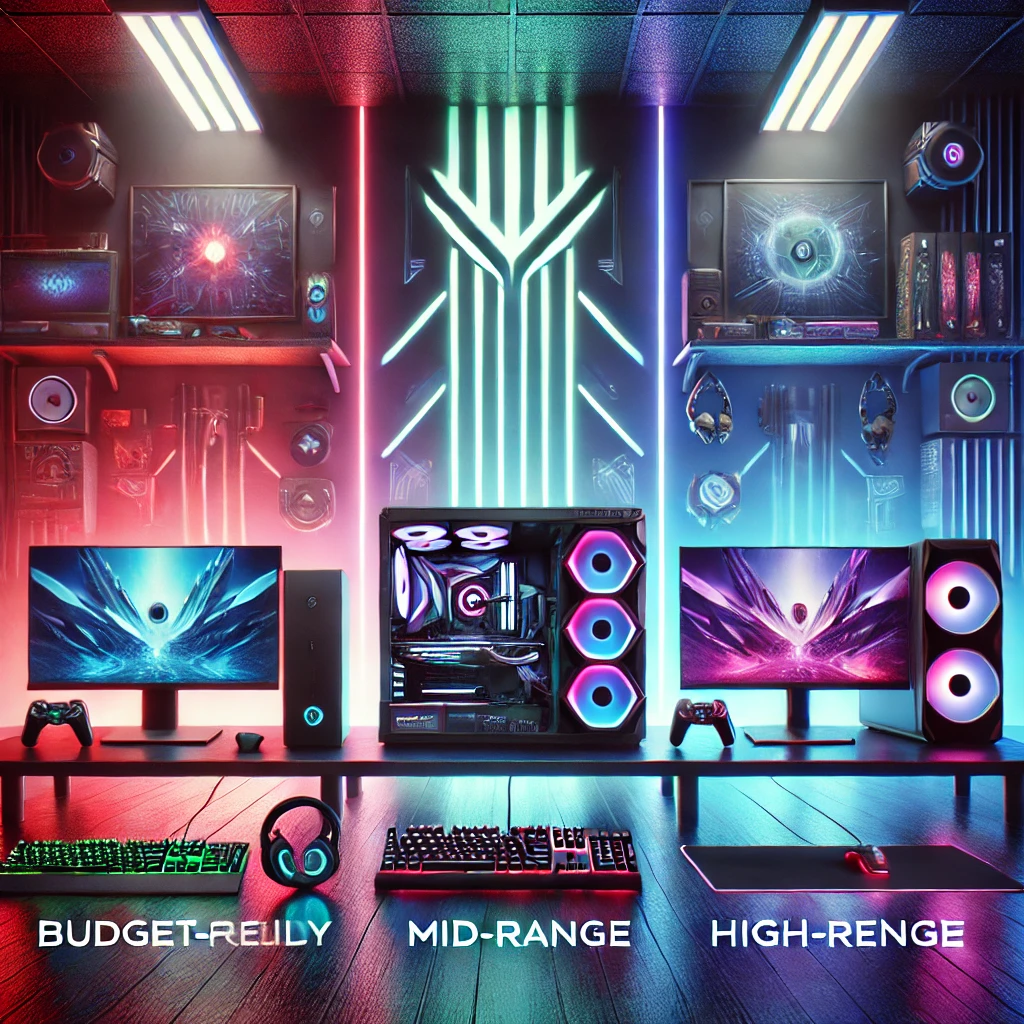
Key Features of a Gaming PC for Competitive Gaming
When it comes to competitive gaming, the right gaming PC can make the difference between victory and defeat. Let’s explore the critical features that every competitive gamer should prioritize.
2.1. Performance Priorities
In competitive gaming, achieving high FPS (Frames Per Second) and low latency is essential for a smooth and responsive gaming experience. FPS directly impacts how fluid the gameplay appears, with higher FPS providing a competitive edge by making movements and actions more precise. For titles like Valorant or CS:GO 2, where split-second reactions matter, consistent FPS above 120 is recommended.
The CPU and GPU play vital roles in this. A powerful CPU, such as an Intel i7/i9 or AMD Ryzen 7/9, ensures the game engine processes data quickly, while a high-performance GPU, like the NVIDIA RTX 4060 or better, renders graphics with minimal lag. Together, they form the backbone of a gaming PC capable of meeting the demands of competitive esports.
2.2. Monitor Compatibility
A great gaming PC deserves a compatible monitor. Refresh rates, measured in Hz, determine how many frames your monitor can display per second. For competitive gaming, monitors with refresh rates of 144Hz, 240Hz, or even 360Hz are ideal. Pair this with a low response time of 1ms to ensure fast input-to-screen performance. It’s important to match your PC’s output capabilities to your monitor’s specifications to avoid bottlenecks.
2.3. Cooling Systems and Overclocking
Long gaming sessions generate heat, and efficient cooling systems prevent performance throttling. Air and liquid cooling solutions keep your system stable. For gamers seeking an extra edge, overclocking the CPU or GPU can enhance performance, but proper cooling is critical to avoid overheating.
2.4. Future-Proofing
Future-proofing your gaming PC ensures longevity in the fast-evolving gaming industry. Invest in modular systems with room for upgrades, such as additional RAM slots or newer GPUs. This approach allows you to handle upcoming game requirements without overhauling your entire system.
By prioritizing these features, competitive gamers can achieve peak performance and remain prepared for future challenges.
Hardware Recommendations for Competitive Gaming PCs
3.1. Processors (CPUs)
The CPU is the brain of your gaming PC, making it crucial for competitive gaming. Top choices include the Intel Core i9 and AMD Ryzen 7 or Ryzen 9 processors, which offer high clock speeds and excellent multi-core performance. Competitive games like Valorant and CS:GO 2 rely heavily on single-core performance, so prioritize CPUs with higher clock speeds (e.g., 4 GHz or more). For games that involve multitasking, such as streaming and gaming simultaneously, more cores (6 to 12) provide smoother performance.
3.2. Graphics Cards (GPUs)
The GPU determines how well your system handles high-resolution visuals and consistent frame rates. For competitive gaming, the NVIDIA RTX 40-series (e.g., RTX 4060, 4070) or AMD Radeon RX 7000-series (e.g., RX 7600, 7700) are recommended. These GPUs balance high FPS with efficient power consumption. Focus on GPUs with at least 8GB VRAM, which ensures smooth gameplay even at higher settings. While ray tracing adds stunning visuals, it’s better to prioritize frame rates over aesthetics for competitive gaming.
3.3. Memory (RAM)
For competitive gaming, 16GB DDR5 RAM is the baseline, but 32GB is ideal for multitasking and future-proofing. Opt for dual-channel RAM to improve bandwidth and system responsiveness, as it significantly boosts gaming performance compared to single-channel configurations.
3.4. Storage
Fast load times are essential in competitive gaming. Use an NVMe SSD for primary storage, ensuring quick boot times and minimal in-game stuttering. A capacity of 1TB is optimal, with an optional HDD for additional storage.
3.5. Motherboard and Power Supply
Choose a motherboard with a gaming-friendly chipset (e.g., Z790, B650) and ample connectivity for peripherals. For power supply, a reliable PSU with 80+ Gold certification and adequate wattage (600–750W) ensures stable performance and supports future upgrades.
This hardware combination is designed to deliver the performance competitive gamers need to excel.
Pre-Built Gaming PCs vs. Custom Builds
Choosing between a pre-built gaming PC and a custom-built system is a crucial decision for competitive gamers. Each option offers unique advantages, so understanding their differences can help you make the best choice.
4.1. Advantages of Pre-Built PCs
Pre-built gaming PCs are ideal for gamers who value convenience and reliability. These systems are assembled and tested by professionals, ensuring compatibility and performance right out of the box. They often come with warranties covering the entire build, offering peace of mind in case of hardware issues.
Another benefit is the pre-installed software and optimizations tailored for gaming. Many pre-built PCs feature settings configured to maximize FPS and reduce input lag, crucial for competitive gaming. Brands like Alienware and ASUS ROG even include gaming-focused utilities for easy performance tweaks.
4.2. Advantages of Custom Builds
Custom-built PCs provide unmatched flexibility for gamers with specific hardware needs. You can handpick components such as the CPU, GPU, and RAM, tailoring the system to excel in the games you play most. For instance, an NVIDIA RTX 4060 GPU paired with a high-refresh-rate monitor is ideal for FPS games like Valorant or CS:GO 2.
Cost savings are another advantage. By sourcing components during sales or promotions, you can often build a high-performance gaming PC for less than the cost of a pre-built system. Additionally, custom builds are future-proof, allowing for easier upgrades as gaming technology evolves.
4.3. Which Option is Best for Competitive Gamers?
The choice depends on your budget, expertise, and gaming goals. If you’re new to gaming PCs or want a hassle-free experience, a pre-built PC with reliable warranties is a great option. However, if you have the technical know-how and want tailored performance or long-term flexibility, a custom build is the way to go. Competitive gamers often lean toward custom builds to maximize performance and gain a competitive edge.
Recommended Gaming PCs for Competitive Gamers
5.1 Budget-Friendly PCs
For aspiring competitive gamers, budget-friendly gaming PCs offer a solid entry point without breaking the bank. These PCs are designed to run popular esports titles like Valorant, CS:GO 2, and League of Legends at stable FPS on medium to high settings.
Recommended specs include a quad-core processor (Intel Core i5 or AMD Ryzen 5), 8GB of RAM, and a NVIDIA GTX 1650 or AMD RX 6500 XT GPU. Pairing these components with a 256GB or 512GB SSD ensures faster load times and smooth gameplay. Budget gaming PCs like the HP Pavilion Gaming Desktop or the Acer Nitro 50 deliver dependable performance for competitive play at prices starting around $800–$1,000.
5.2 Mid-Range PCs
Mid-range gaming PCs strike the perfect balance between performance and affordability, offering excellent FPS and multitasking capabilities. These setups are ideal for competitive gamers aiming to climb the ranks while streaming or running background applications.
Look for a six-core processor (Intel Core i5-13600K or AMD Ryzen 7 5800X), 16GB of RAM, and a GPU like the NVIDIA RTX 3060 Ti or AMD Radeon RX 6700 XT. These specs handle competitive games at 1080p or 1440p resolutions with refresh rates of 144Hz or higher. Pre-built options such as the Dell G5 Gaming Desktop or the MSI Trident 3 are priced between $1,200 and $1,800, providing great value for serious gamers.
5.3 High-End PCs
For professional esports enthusiasts, high-end gaming PCs deliver unmatched performance for ultra-high settings and advanced peripherals. Equipped with a 12-core processor (Intel Core i9-13900K or AMD Ryzen 9 7900X), 32GB of RAM, and a NVIDIA RTX 4080/4090 GPU, these machines ensure exceptional FPS and ray tracing capabilities for immersive visuals.
High-end PCs like the Alienware Aurora R15 or the Corsair Vengeance i7400 support 4K gaming, VR compatibility, and future-proofing. These setups typically start at $2,500, offering the pinnacle of competitive gaming technology.
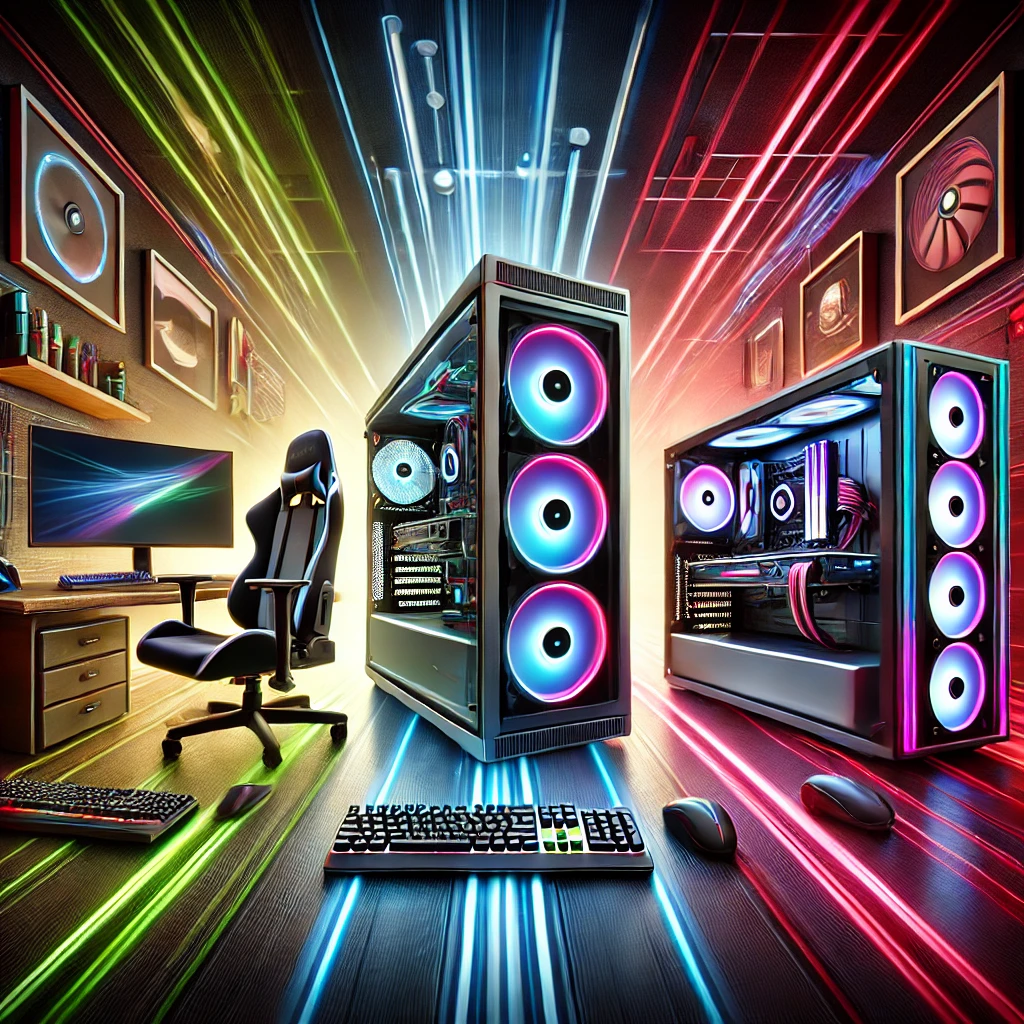
Optimizing Your Gaming PC for Competitive Play
6.1 Hardware Tweaks
Maximizing FPS is critical for competitive gaming, as even a slight drop can disrupt gameplay in fast-paced matches. Start by lowering graphic settings such as shadows, textures, and anti-aliasing to prioritize performance over visuals. Set your resolution to match your monitor’s native refresh rate, ideally 144Hz or higher, for smoother gameplay.
Overclocking your GPU and CPU can further enhance performance, but ensure it’s done safely. Use software like MSI Afterburner or Intel Extreme Tuning Utility to fine-tune clock speeds and monitor temperatures. Proper cooling systems are essential during overclocking to avoid overheating and maintain system stability.
6.2 Software and Drivers
Keeping your gaming PC’s software and drivers updated is just as important as the hardware itself. Outdated GPU drivers can lead to poor performance, crashes, and compatibility issues with newer games. Use tools like NVIDIA GeForce Experience or AMD Adrenalin Software to automatically update your graphics drivers.
Gaming optimization tools such as Razer Cortex or CCleaner can help streamline your PC’s performance by closing unnecessary background applications and freeing up resources. Additionally, ensure your operating system is up-to-date and disable non-essential startup programs to reduce boot times.
6.3 Internet Connectivity
In competitive gaming, low-latency internet is a game-changer. Lag can mean the difference between winning and losing. For a stable connection, use a wired Ethernet connection instead of Wi-Fi. If Ethernet is not an option, invest in a high-quality gaming router like the ASUS ROG Rapture or Netgear Nighthawk Pro Gaming Router, which prioritize gaming traffic and reduce ping.
Optimize network settings by closing bandwidth-hogging apps and setting up Quality of Service (QoS) rules to prioritize gaming devices. With these tweaks, your PC will stay competitive in both performance and connectivity.
Peripherals to Maximize Competitive Performance
7.1 Gaming Keyboards and Mice
The right gaming keyboard and mouse can significantly enhance your competitive performance. Mechanical keyboards are the gold standard for esports players due to their fast response times and tactile feedback. Look for keyboards with low actuation points and anti-ghosting features to ensure every keypress registers instantly. Popular options like the SteelSeries Apex Pro or the Logitech G Pro X Keyboard are widely used by competitive gamers.
For gaming mice, adjustable DPI settings and a lightweight design are crucial for precise movements and swift reactions. Models like the Razer DeathAdder V3 Pro and Logitech G Pro X Superlight offer high DPI ranges, ergonomic designs, and durable switches, making them ideal for fast-paced esports like Valorant and CS:GO 2.
7.2 Gaming Headsets
Accurate audio cues are essential in competitive gaming, where pinpointing footsteps or enemy gunfire can give you the edge. Gaming headsets with surround sound and low latency ensure you never miss a critical moment. Look for features like noise isolation, a built-in microphone, and compatibility with your gaming setup.
The HyperX Cloud Alpha Wireless and SteelSeries Arctis Pro headsets are favorites among esports professionals, offering exceptional sound clarity and comfort for extended play sessions. Whether you’re communicating with teammates or tuning into in-game audio, a high-quality headset can elevate your performance.
7.3 Other Accessories
Comfort and ergonomics play a huge role in competitive gaming. An ergonomic gaming chair like the Herman Miller x Logitech Embody supports long hours of play while reducing strain. Pair this with a sturdy gaming desk for a clutter-free setup. For players who prefer controllers, models like the Xbox Elite Series 2 offer customizability and compatibility with most gaming PCs, ensuring seamless control in competitive titles.
Tips for Maintaining Your Gaming PC
Proper maintenance is essential to ensure your gaming PC continues to deliver high performance for competitive gaming. Follow these tips to keep your setup in top shape and avoid any unexpected disruptions during crucial matches.
Regular Cleaning and Dust Removal
Dust buildup can overheat your gaming PC, reducing performance and potentially damaging components. Clean your PC every few months by removing dust from fans, vents, and hardware using compressed air or an anti-static brush. Focus on the GPU, CPU cooler, and power supply, as these areas are prone to dust accumulation. Keeping your workspace dust-free also helps maintain a healthy environment for your gaming setup.
Managing Software to Avoid Performance Bottlenecks
Unnecessary software running in the background can hog system resources and slow down your gaming PC. Regularly check for unused programs and disable startup processes to free up CPU and RAM. Use tools like MSI Afterburner or Razer Cortex to optimize your system for gaming. Keep your drivers, especially for the GPU, up to date to ensure compatibility with the latest competitive gaming titles and achieve the best FPS performance.
Monitoring Temperatures and Performance with Tools
Overheating can severely impact gaming performance, causing lag or even hardware failure. Monitor your PC’s temperature using tools like HWMonitor or NZXT CAM. Ensure the CPU and GPU temperatures stay within safe limits during intense gaming sessions. If temperatures spike, consider improving airflow by adding case fans or upgrading your cooling system.
By cleaning your hardware, managing software efficiently, and keeping an eye on temperatures, your gaming PC will remain in optimal condition for competitive play. These small maintenance habits can significantly extend your PC’s lifespan and ensure peak performance during high-stakes gaming moments.
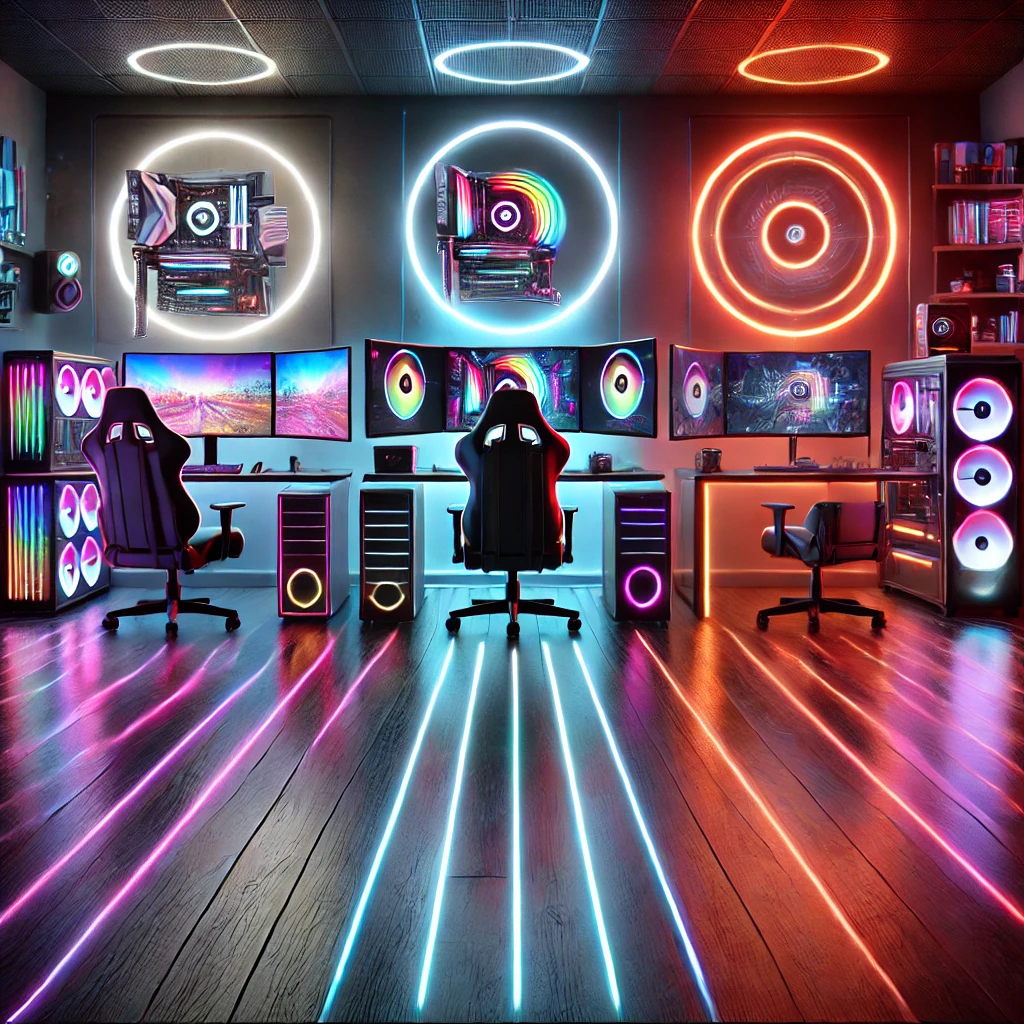
Conclusion
Choosing the best gaming PC for competitive gaming is a crucial investment for any gamer aiming to improve their performance. Whether you’re an aspiring competitor or a seasoned esports enthusiast, the right hardware can give you the edge needed to stay ahead in fast-paced games.
For those just starting, budget-friendly gaming PCs with reliable performance are a great way to get into competitive gaming without overspending. Mid-range PCs provide excellent value for money, balancing high FPS and multitasking capabilities, ideal for gamers looking to improve their rankings. Meanwhile, high-end setups are perfect for serious esports players who want ultra-smooth gameplay, advanced visuals, and future-proof technology.
Remember, investing in a gaming PC tailored to your specific needs and goals will significantly enhance your competitive gaming experience. Focus on the key specifications like a powerful GPU, a high-refresh-rate monitor, and sufficient RAM to ensure smooth, low-latency gameplay.
If you have questions about which PC is best for you or need guidance on specifications, leave a comment below. Your input helps us improve our content and ensure it addresses your needs. Let’s build a competitive edge together—start your gaming journey with the perfect PC today!
FAQs for The Best Gaming PCs for Competitive Gamers
1. How much should I spend on a gaming PC for competitive gaming?
The budget depends on your gaming goals. For entry-level competitive gaming, $800–$1,200 is sufficient. For mid-range builds, aim for $1,200–$2,000. High-end setups for professional gamers typically cost $2,500 or more.
2. What are the most important specs for a competitive gaming PC?
Focus on a high-performance CPU (e.g., Intel i7/i9 or AMD Ryzen 7/9), a powerful GPU (e.g., NVIDIA RTX 4060 or better), at least 16GB of RAM, and an NVMe SSD for fast load times.
3. Should I buy a pre-built gaming PC or build my own?
Pre-built PCs are convenient and come with warranties, but custom builds allow you to tailor the system to your specific needs and often save money. Choose based on your technical expertise and time availability.
4. How can I ensure low latency during competitive gaming?
Use a gaming PC with high FPS capability, a monitor with low response time (1 ms), and high refresh rates (144Hz+). Also, optimize your network with a gaming router and prioritize Ethernet over Wi-Fi for better stability.
5. Can I upgrade my gaming PC later?
Yes, most gaming PCs are modular, allowing upgrades to components like the GPU, RAM, storage, or CPU in the future. Ensure your PC has a compatible motherboard and sufficient power supply for upgrades.


